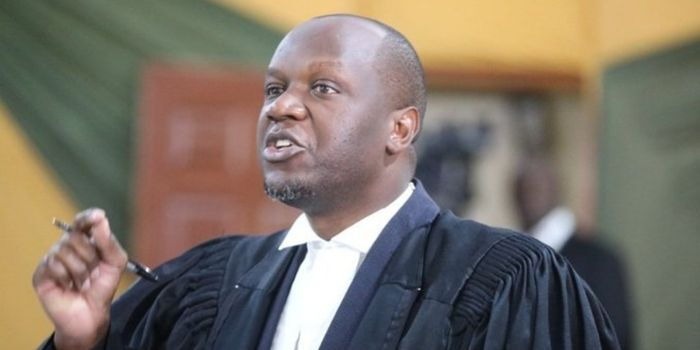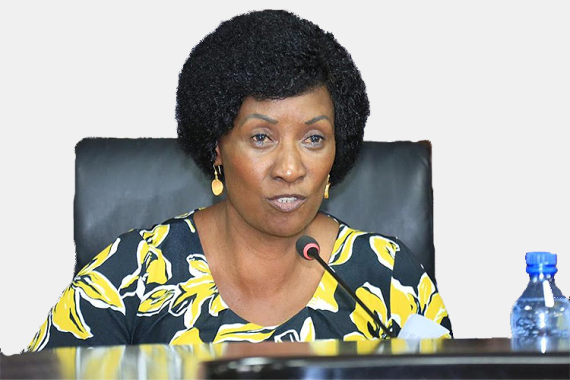Lawyer Willis Otieno has cautioned Kenyan police officers against carrying out Interior Cabinet Secretary Kipchumba Murkomen’s controversial “shoot-to-kill” directive. Otieno issued the warning via a strongly worded statement on his X account in the early hours of Friday, June 27.
Otieno challenged the legality of Murkomen’s directive, which instructs officers to shoot anyone approaching a police station with allegedly malicious intent. He wrote:
“Dear Police Officers, If you choose to follow illegal orders from @kipmurkomen or any politician drunk on power, know this: you will stand alone in the dock. When the dust settles , and it always does the cameras will have your face, not his.”
He emphasized that any officer who obeys these instructions risks legal consequences. Furthermore, Otieno cautioned that politicians promising immunity will soon abandon them. “The same people using you today will abandon you tomorrow. No uniform protects you from accountability. No title will shield you from justice. The long arm of the law may be slow, but it never forgets. Choose the Constitution, not chaos.”
Otieno’s remarks come hours after CS Murkomen inspected police stations in Kiambu County and urged officers to defend their stations at all costs. Murkomen explained that the directive came in response to repeated attacks and mockery by trespassers. He said;
“Ile shida inafanya saa zingine polisi wapige wakora risasi ni kwa sababu… wanarudi kuchekelea polisi… mtu yeyote ambaye atakaribia police station, piga yeye risasi.”
Murkomen defended his stance, insisting that firearms are tools for defense, not ornaments. He noted that some individuals arrested during protests later returned to instigate unrest. “You should only run when you see that with whatever you have, even if you were to kill five or six, there are still many left,” he said during the visit.
Opposition has been swift and pointed. Alongside Otieno, former KICC Board chairman Irungu Nyakera also condemned the orders, calling them “reckless, dangerous,” and labelling the instruction as an incitement to extrajudicial killings. He cautioned officers that the “blood you spill” will not be forgotten and warned that the International Criminal Court would hold them accountable.
Observers noted that Otieno’s warning highlights a growing divide between the executive’s heavy-handed rhetoric and constitutional protections of citizens. On one hand, Murkomen frames the directive as a necessary deterrent. On the other, legal experts argue it violates human rights and undermines due process.
Civil society leaders have also joined the conversation. A national NGO official, speaking on condition of anonymity, emphasized that crowd control measures must respect constitutional limits. They echoed Otieno’s call for police to deploy proportionate and lawful responses.







best online casino usa paypal
References:
http://www.likelegal.nl
online casinos that accept paypal
References:
directorio.restaurantesdeperu.com
If the brightness isn’t working on your laptop, this
can be for a number of different reasons. Changing the brightness on Windows 10 is a relatively simple process, but you have multiple ways.
His work can be found on many websites and focuses on topics
such as Microsoft Office, Apple devices, Android devices,
Photoshop, and more. Keep the curiosity alive and continue to
dive deeper into your device’s capabilities. Perhaps you’re
curious about customizing other aspects of your display
or learning how to optimize your computer’s performance.
“Yungblud was number one in seven countries, and I wasn’t happy because it wasn’t the album I wanted to make,” he says.
And the first year of his Bludfest in Milton Keynes
was criticised after long queues and a lack of water caused fans to pass out
and miss the concert. Those number one albums both fell out of the Top 30 after one week, a sign of a strong core
fanbase, with limited crossover appeal. Two number one albums, an international fanbase, a Louis
Theroux documentary and enough clout to run his own festival.
“But Richard Ashcroft didn’t tell me I was ready to face the day. I said that to myself.
Here’s a step-by-step guide to help you adjust brightness on Windows 10. If your device has brightness keys on the keyboard, they might offer an even faster route. Simply access the Settings menu, navigate to Display options, and tweak the brightness slider until you reach a comfortable level.
References:
https://blackcoin.co/casino-strategies-the-best-tips-tricks-profit-makers/
Aussie-friendly casinos offer 24/7 customer service, accept AUD, and provide clear terms.
Always choose a casino that holds a license from a recognised regulator, like Curaçao or Malta.
I play with limits, and when the luck’s there, great!
The biggest thing I’ll say is this—online gambling should always be for fun, not for making money.
Whether you’re a casual player or chasing big wins, there’s always
something extra coming your way.
For extended fun, new players can also claim
a AU$50 free chip with the code PLAYCOOL!
Sign up as a new player to receive a free welcome gift worth triple your deposit up to AU$5,000, plus get an extra
AU$50 free chip no strings attached. Triple your deposit with
up to $5000 in free casino chips. Verification can help ensure
real people are writing the reviews you read on Trustpilot.
References:
https://blackcoin.co/video-poker-rules-progressive-jackpot/
Hier werden Probleme begraben, unzählige Körper
warten im Sand und täglich werden neue Löcher
ausgehoben, die ein Problem lösen und im selben Schritt ein neues heraufbeschwören. Von der
Außenwelt bis aufs Perverseste idealisiert und überhöht, ist es kein zufälliger Umstand, dass man die Wüste ringsum des neongrellne, hyperbolischen Sündenbabel in der Dunkelheit nicht mehr sehen kann.
Nicky hingegen ist ein Terrier im mafiösen Gestrüpp,
niemand würde sich mit ihm anlegen, seine gewaltätige Vehemenz ist allseits bekannt und bringt ihm
später auch den Ruf als eigentlicher Boss von Las Vegas ein.
Kevin Pollak und James Woods, die beide regelmäßig an der World Series of Poker teilnehmen, waren ebenfalls fantastisch,
ebenso wie Frank Vincent, der, wie ich glaube, in jeder einzelnen Mafia-Fernsehshow oder in jedem Film, der je gedreht
wurde, zu sehen war, und damit bin ich völlig einverstanden. In ihrer besten Darbietung seit Basic Instinct war Stone,
wie oben erwähnt, ausgezeichnet, ebenso wie Don Rickles (Gott hab‘ ihn selig; vielleicht der lustigste Mann der Geschichte?).
Die Szene, in der Nicky den Kopf eines Klugscheißers in einen Schraubstock zwängt, ist so grausig wie es nur geht, und eine der erschreckendsten Szenen kommt,
als Nicky schließlich sein Ableben erlebt und
geschlagen und lebendig in einem Maisfeld begraben wird.
Wie De Niro wurde auch Pesci für die Rolle des Nicky
Santoro, der bombastischen rechten Hand von Rothstein, geboren. De Niro war, nun ja, De Niro, der sich seine Rolle als Sam „Ace“ Rothstein absolut zu eigen machte.
Ich fordere jeden heraus, diesen Film zu sehen und mir zu sagen, dass er nicht mehr Auszeichnungen verdient hätte.
References:
https://online-spielhallen.de/netbet-casino-promo-code-ihr-schlussel-zu-exklusiven-vorteilen/